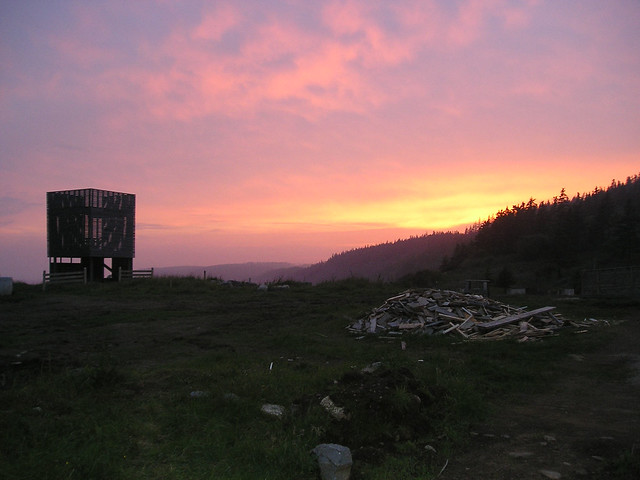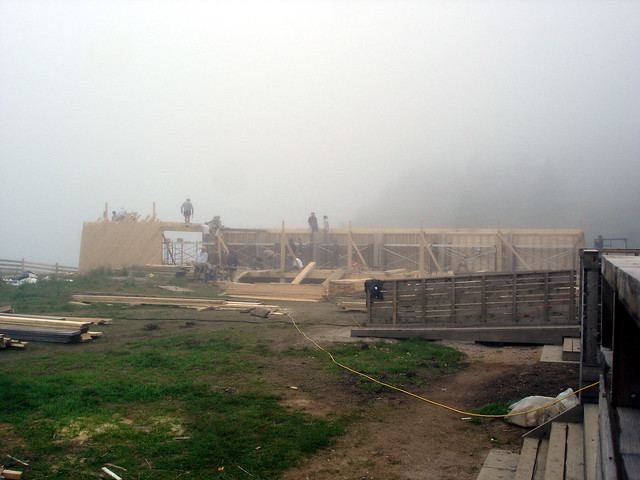Book Review: Local Architecture
Local Architecture: Building Place, Craft, and Community by Brian-MacKay-Lyons, edited by Robert McCarter, published by Princeton Architectural Press, 2015. Hardcover, 224 pages. (Amazon)

Ghost, a laboratory run by Canadian architect Brian MacKay-Lyons where architecture students would design and build small structures on land owned by the architect in Nova Scotia, started in 1994 with "a resurrection of a house silhouette in a cow field, an apparition, a ghost raised from earlier times." In 2011, twelve Ghosts later, it went on hiatus. To mark what might be seen as the completion of an experiment started by MacKay-Lyons, a principal at MacKay-Lyons Sweetapple Architects, Ghost 13 was a three-day symposium, themed "Ideas in Things," held on the same property in June 2011. This book documents the symposium and its who's-who list of architects respected for, as the title attests, creating architecture that responds to place, craft and community. Although the book does not summarize the twelve Ghost pavilions (a 2008 book documents the first nine), it does summarize the ideas behind the undertaking.

[Photo of Ghost 6 by archaalto]
The book has three parts. First are the three symposium keynotes by Kenneth Frampton, Juhani Pallasmaa, and Glenn Murcutt. Each one is valuable: Frampton for critically looking as his idea of critical regionalism; Pallasmaa for exploring a "call for a sustainable metaphor," or something that make sustainability more than just a functional notion; and Murcutt for honestly answering the questions from Pallasmaa about his background and approach to architecture (the questions were submitted by symposium participants and selected by MacKay-Lyons and Robert McCarter). Second are projects by symposium speakers: Marlon Blackwell, Wendell Burnette, Vincent James, Rick Joy, Tom Kundig, Patricia Patkau, Dan Rockhill, and Bridgitte Shim, to name just a few. This section takes up the most pages, adding plenty of eye candy to the otherwise word-heavy content. Third and last are essays by symposium critics Peter Buchanan and Robert McCarter (Tom Fisher supplies the book's introduction), as well as Ingerid Helsing Almaas, Christine Macy and Essy Baniassad.

[Building Ghost 8 | Photo by archaalto]
The ideas prevalent in Ghost 13 are not just the givens of place, craft and community; they are education (what MacKay-Lyons calls "the elephant in the room" during the symposium) and making. The "Ideas in Things" theme implies that a thing must be made for the idea to be expressed, experienced, tested, learned from, etc. It's no wonder then that the projects that make up the middle portion of the book are all built – no speculative renderings, just photographs and architectural drawings. None of this is too shocking or groundbreaking; MacKay-Lyons even says in his afterword that the symposium might be seen as "preaching to the choir." But what I wish came across more in the book was the experience of the symposium, which sounds like an amazing time for those presenting as well as those attending. Much of that must have come from the place itself, the property of the Ghosts that so eloquently expresses in built form what the symposium, and this book, was trying to say in words and images.

Ghost, a laboratory run by Canadian architect Brian MacKay-Lyons where architecture students would design and build small structures on land owned by the architect in Nova Scotia, started in 1994 with "a resurrection of a house silhouette in a cow field, an apparition, a ghost raised from earlier times." In 2011, twelve Ghosts later, it went on hiatus. To mark what might be seen as the completion of an experiment started by MacKay-Lyons, a principal at MacKay-Lyons Sweetapple Architects, Ghost 13 was a three-day symposium, themed "Ideas in Things," held on the same property in June 2011. This book documents the symposium and its who's-who list of architects respected for, as the title attests, creating architecture that responds to place, craft and community. Although the book does not summarize the twelve Ghost pavilions (a 2008 book documents the first nine), it does summarize the ideas behind the undertaking.

[Photo of Ghost 6 by archaalto]
The book has three parts. First are the three symposium keynotes by Kenneth Frampton, Juhani Pallasmaa, and Glenn Murcutt. Each one is valuable: Frampton for critically looking as his idea of critical regionalism; Pallasmaa for exploring a "call for a sustainable metaphor," or something that make sustainability more than just a functional notion; and Murcutt for honestly answering the questions from Pallasmaa about his background and approach to architecture (the questions were submitted by symposium participants and selected by MacKay-Lyons and Robert McCarter). Second are projects by symposium speakers: Marlon Blackwell, Wendell Burnette, Vincent James, Rick Joy, Tom Kundig, Patricia Patkau, Dan Rockhill, and Bridgitte Shim, to name just a few. This section takes up the most pages, adding plenty of eye candy to the otherwise word-heavy content. Third and last are essays by symposium critics Peter Buchanan and Robert McCarter (Tom Fisher supplies the book's introduction), as well as Ingerid Helsing Almaas, Christine Macy and Essy Baniassad.

[Building Ghost 8 | Photo by archaalto]
The ideas prevalent in Ghost 13 are not just the givens of place, craft and community; they are education (what MacKay-Lyons calls "the elephant in the room" during the symposium) and making. The "Ideas in Things" theme implies that a thing must be made for the idea to be expressed, experienced, tested, learned from, etc. It's no wonder then that the projects that make up the middle portion of the book are all built – no speculative renderings, just photographs and architectural drawings. None of this is too shocking or groundbreaking; MacKay-Lyons even says in his afterword that the symposium might be seen as "preaching to the choir." But what I wish came across more in the book was the experience of the symposium, which sounds like an amazing time for those presenting as well as those attending. Much of that must have come from the place itself, the property of the Ghosts that so eloquently expresses in built form what the symposium, and this book, was trying to say in words and images.
Comments
Post a Comment
Comments are moderated for spam.